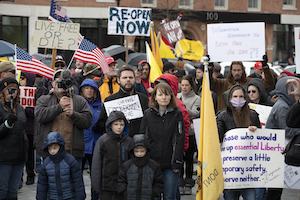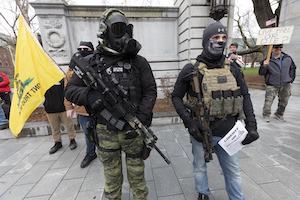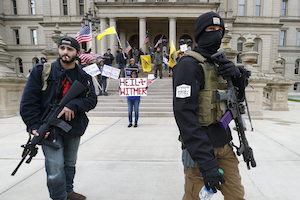Clashes, anger erupt with demands to reopen America
By Brian E. Muhammad -Contributing Writer- | Last updated: Apr 28, 2020 - 5:19:16 AMWhat's your opinion on this article?
As some governors are removing restrictions in the name of reopening the American economy wrecked by the coronavirus pandemic, there are strong calls by various political leaders and those in the medical and scientific field telling the American people to hold their “stay at home” positions, for their own safety.

“The Coved-19 Coronavirus have created a new reality for us,” said Ishmael Muhammad, the student national assistant to the Honorable Minister Louis Farrakhan in April 26 remarks at the Nation of Islam weekly broadcast at Mosque Maryam in Chicago.
“So, all of us are now under confinement. Some of us are upset and you see the protest,” said Student Minister Ishmael Muhammad. “I’m embarrassed to see how America is displaying herself before the world.”
Speaking via webcast, the Muslim minster disagreed with the efforts to relax stay-in orders against the Coronavirus.
“The Honorable Minister Louis Farrakhan has instructed us to follow the guidelines and the protocols established by government, scientists and doctors,” he said.
With the echoes to stay in, comparatively there has been relatively small protests in some states demanding the temporary government protocols preventing free movement get relaxed. Despite U.S. Covid-19 numbers reaching near one million confirmed infected people and over 55,000 deceased and climbing, there is mass uncertainty and growing vitriol.

“With my daughter looking over my shoulder, I received this message on my phone,” wrote Atlanta Mayor Kiesha Bottoms in an April 23 tweet. She was referring to a vile text message she received the night before from @ReopenGeorgia.gov that said “Nigger, just shut-up and RE-OPEN ATLANTA!”
“I pray for you,” Mayor Bottoms further wrote and quoting Dr. Martin Luther King, Jr. ‘“Conscientious stupidity or sincere ignorance?’”
Georgia Attorney General Chris Carr has directed the prosecution division of his office to investigate who sent the text.
Mayor Bottoms has been a vocal advocate of the “stay at home” policies and has been at odds with Georgia’s Republican governor Brian Kemp who announced he was allowing businesses like, barber shops, beauty and nail salons and bowling alleys to reopen in the state. According to the mayor there was no consultation with local officials statewide on the ramifications of the decision. By Final Call press time the state had 23,216 infected residents and 907 deaths of which 54 percent were Black.
Georgia is one of a number of states across the country where governors were either considering reopening economies or are facing pressure from business leaders or a small vocal group of protestors demanding it. However, at what cost, is the pressing question?
Health experts maintain relaxing measures to reopen the economy too soon may pose other unpredictable threats. If a second wave of the virus occurs, along with the cost of human life, the economy would shutter again, with potentially more severity.
New Orleans Mayor LaToya Cantrell also stood with the stay at home protocol against the demand of business leaders of one of America’s highest tourist markets as well as a date given by the Louisiana governor to reopen its economy at the end of April.
Louisiana Gov. John Bel Edwards, a Democrat said the state should be able to begin to reopen soon and mandated a stay-at-home order until April 30, reported local WDSU-TV. Mayor Cantrell extended her order until May 15.
“The data will drive us and not a specific date,” she told the press on April 20, vowing not to be bullied to lift the order before the health safety of the people.
“We cannot fall into any false narratives ... when it comes to the public health of our citizens, and there is no economy without public health, hand in hand,” said Mayor Cantrell, also a Democrat.
It is a complicated equation balancing the government interest and public interest in the unprecedented pandemic, Jamie Mayo, long time mayor of Monroe, Louisiana told The Final Call in a telephone interview.
“We all, as elected officials are in a tough situation,” said Mayor Mayo, adding, “the economy has changed, but human life is very important too,” He said his number one priority is human life.
“Now having said that, we know that business is the heartbeat of our country,” said Mayor Mayo. But there has to be caution in reopening everything to the public, he explained.
“If you open things back up to the way it was, whatever progress that you’ve made trying to flatten the curve, there’s going to be a surge in infections again,” said Mayor Mayo. “We’re in a new normal now.”
When asked about Louisiana Gov. Edwards projected timetable, Mayor Mayo said the projected date is not a solid date for everything to be open.
Mayor Mayo supports a “measured approach” and “not a wholesale approach” to opening the economy. However, reopening should not be rushed.
The governors in New York, New Jersey and Connecticut are also being cautious while Florida reopened some of its beaches with social distancing guidelines. Republican governors in South Carolina, Tennessee, Mississippi and Ohio are following suit.
Although such moves are being made, coupled with isolated protests to reopen, polls show most Americans believe it’s premature and unsafe to ease the restrictions. A mid-April 2020 Kaiser Foundation poll found 80 percent of Americans supports strict shelter-in-place policies compared to 19 percent who say the measures pose “unnecessary burdens” and “cause more harm” than good.
A Washington Post-University of Maryland poll said 65 percent of Americans believe it will take until after June to safely resume gatherings of 10 or more people.
According to the U.S. Labor Department, while the debate on re-opening the economy escalates, Covid-19 has wreaked havoc on job security.
Labor Department figures show 26 million people filed for unemployment since the onslaught of Covid-19. Economists forecast that the unemployment rate for April could go as high as 20 percent replete with a steep fall of the American economy comparable to the Great Depression of the 1930s and surpassing the recession of 2009. Managing the crisis is one thing, the long hall may be another say economists.
“Latest American unemployment claim figures suggest one in six workers - or 26.4 million- have lost their jobs since this crisis emerged. Supporting them now with benefits is one challenge; creating jobs for them once normal trading resumes is another,” explained Dharshini David, economist and author of “The Almighty Dollar.”
Like the disparaging higher numbers of Blacks who have contracted and succumbed to the virus, Blacks and Latinos are experiencing a heavy toll economically as well. They are typically among the first to be laid off in recessions.
The government doesn’t track the jobless claims data by gender or race, a survey by the University of Southern California found that 21 percent of Blacks and 18 percent of Latinos say they have lost jobs in the past month, compared with 15 percent of Whites.
One factor noted is the ability to work from home. A study by the Center for American Progress found that Whites are more than twice as likely as Blacks to say they can work from home and 50 percent more likely than Latinos.
Although Florida, Tennessee, South Carolina, and Georgia reopened some businesses, they continued to see a surge in unemployment claims recently. New York and Michigan reported fewer applications. Georgia reported a drop in claims.
The gloomy economic picture was met with protests—which have largely been viewed as political—for states and local governments to reopen non-essential businesses.
There were small pockets of protests in Pennsylvania, California, Ohio, Michigan, Minnesota. Virginia, North Carolina and other states. Under “Operation Gridlock,” “End the Lockdown” and the hashtag “ReOpen,” organizers argue that forcing healthy people to stay home is “tyranny.”
“Government mandating sick people to stay home is called quarantine,” said a ReOpen Virginia press release. “However, mandating healthy citizens to stay home, forcing businesses and churches to close is called tyranny.”
Angry demonstrators obstructed roads, blew car horns, waved flags, chanted and yelled expletives; but conspicuously absent was social distancing and personal protective gear. They carried “I Do Not Consent” and “My Rights Are Essential” placards. Others openly carried semi-automatic weapons, in imagery that raises the question, can the crisis lead to anarchy in America?
However. for these anti-lockdown protestors, a Yahoo News/YouGov poll, showed only 22 percent of Americans supported their demanding an end to their states’ restrictions, while 60 percent opposed them. Despite Trump’s messaging, even Republicans oppose the protests 47 percent to 36 percent. Asked whether they agree or disagree with President Donald Trump’s “LIBERATE” tweets some saw as fueling protesters, only a quarter of Americans say they agree.

Meanwhile, as Mr. Trump is seeking re-election in November, he is becoming anxious to restart the economy.
“I think he’s incredibly desperate,” said political analyst and commentator Wilmer Leon to The Final Call. “He’s becoming more erratic and he’s becoming more irrational the longer this thing plays out.”
Until what President Trump called the “invisible enemy” entered America, the economy and jobs was his rallying cry for another four years in power.
“What they’re trying to do is they’re trying to balance public health against the economy and instead of treating this as a humanitarian crisis, a public health crisis, you hear him using the jingoistic language of war,” said Dr. Leon. “That’s very dangerous language.”
Whenever America finds itself in crisis, it goes to war. “We’ve got a war on drugs…terrorism…now we got to deal with this virus,” he explained.
“When you use that jingoistic, saber-rattling word narrative, one of the things that comes with war is collateral damage,” said Dr. Leon. “You sit back, and you calculate how many people you expect to die from the actions you’re about to take.”
Dr. Leon contends the Trump administration has come to some decision that there’s an acceptable number of the American people they are willing to sacrifice, so long as they can save the economy—as a cost of doing business.
Some public officials are willing to take the trade-off. They see the economic impact of coronavirus worse than the impact on public health. Texas Lt. Gov. Dan Patrick said that some risks had to be taken to avoid fiscal collapse.
“There are more important things than living,” Mr. Patrick told Fox News host Tucker Carlson April 20. “And that’s saving this country for my children and my grandchildren and saving this country for all of us,”
“We’ve got to take some risks and get back in the game and get this country back up and running.”
The coronavirus has exposed in real time, the “unraveling of a great nation” that has been predicted by Nation of Islam patriarch the Most Honorable Elijah Muhammad and warned presently by his top student, Minister Farrakhan.
He has continuously warned that America is engulfed in “affliction,” “distress” and burden.
The Minister warned America of what was on the horizon earlier this year in Detroit at the Nation of Islam’s Saviours’ Day Convention in his message, “The Unraveling of a Great Nation.
“When you unravel something, you undo twisted, knitted, or woven threads; you investigate and solve or explain something complicated or puzzling,” he explained.
“The condition of America is puzzling. The world is looking at a country going to hell. The world is looking at a president who wants to be king; when the Constitution and the founding fathers were trying to run away from what they suffered in Europe under the kings,” stated Min. Farrakhan in his Feb. 23 remarks from the TCF Center.
“There’s a verse in the Qur’an, it’s in the 16th surah, the 92nd verse and it says, ‘Be not like her who unravels her yarn, disintegrating it into pieces, after she has spun it strongly.’ Her here is not talking about a woman, as such, but if you see somebody knitting something, with a design, and they leave it not secured one stitch; and then the same woman who stitched it strongly starts pulling on the yarn that she has knitted until it comes to pieces. That’s what’s happening to America as we speak,” he added.
“I strongly recommend and advise our community and all people of goodwill to seek and to follow the guidance of the Honorable Minister louis Farrakhan during this Covid-19 pandemic,” said Abdul Haleem Muhammad, Southwest student Regional Minister for the Nation of Islam and Minister Farrakhan.
“The American people, particularly this generation, appear to be quite spoiled,” Student Minister Muhammad points out. “The sacrifices made by the American people during the Great Depression and World War II…the draft of the Korean and Vietnam Wars appears to not be appreciated by this generation,” he said.
“Post 9-11 we were told go back to business as usual. We spent trillions of dollars on a war without any tax increases, in fact, taxes have been cut. And we have deployed a volunteer army again and again.”
Student Min. Haleem Muhammad said the American people have not shared in the pain. so now after a few weeks of lockdown there’s a revolt and it’s being inspired from the White House itself.
“The president’s motivation is reelection. The governors in many of the red states motivation is political power and the businesspeople…is money,” he reasoned. “For the small businessman and the working family, it’s survival.”
It is as Minister Farrakhan points out in his book “Torchlight for America,” the American leadership suffers from “greed and inordinate self-interest.”
With lives versus money on the line the American people have to decide concerning their lives.
“If we’re going to make it through this pandemic, it’s going to require all of us to sacrifice for something bigger than ourselves,” said Student Min. Haleem Muhammad.
INSIDE STORIES AND REVIEWS
-
-
About Harriett ... and the Negro Hollywood Road Show
By Rabiah Muhammad, Guest Columnist » Full Story -
Skepticism greets Jay-Z, NFL talk of inspiring change
By Bryan 18X Crawford and Richard B. Muhammad The Final Call Newspaper @TheFinalCall » Full Story -
The painful problem of Black girls and suicide
By Charlene Muhammad -National Correspondent- » Full Story -
Exploitation of Innocence - Report: Perceptions, policies hurting Black girls
By Charlene Muhammad -National Correspondent- » Full Story -
Big Ballin: Big ideas fuel a father’s Big Baller Brand and brash business sense
By Bryan Crawford -Contributing Writer- » Full Story






 Click Here Stay Connected!
Click Here Stay Connected!








